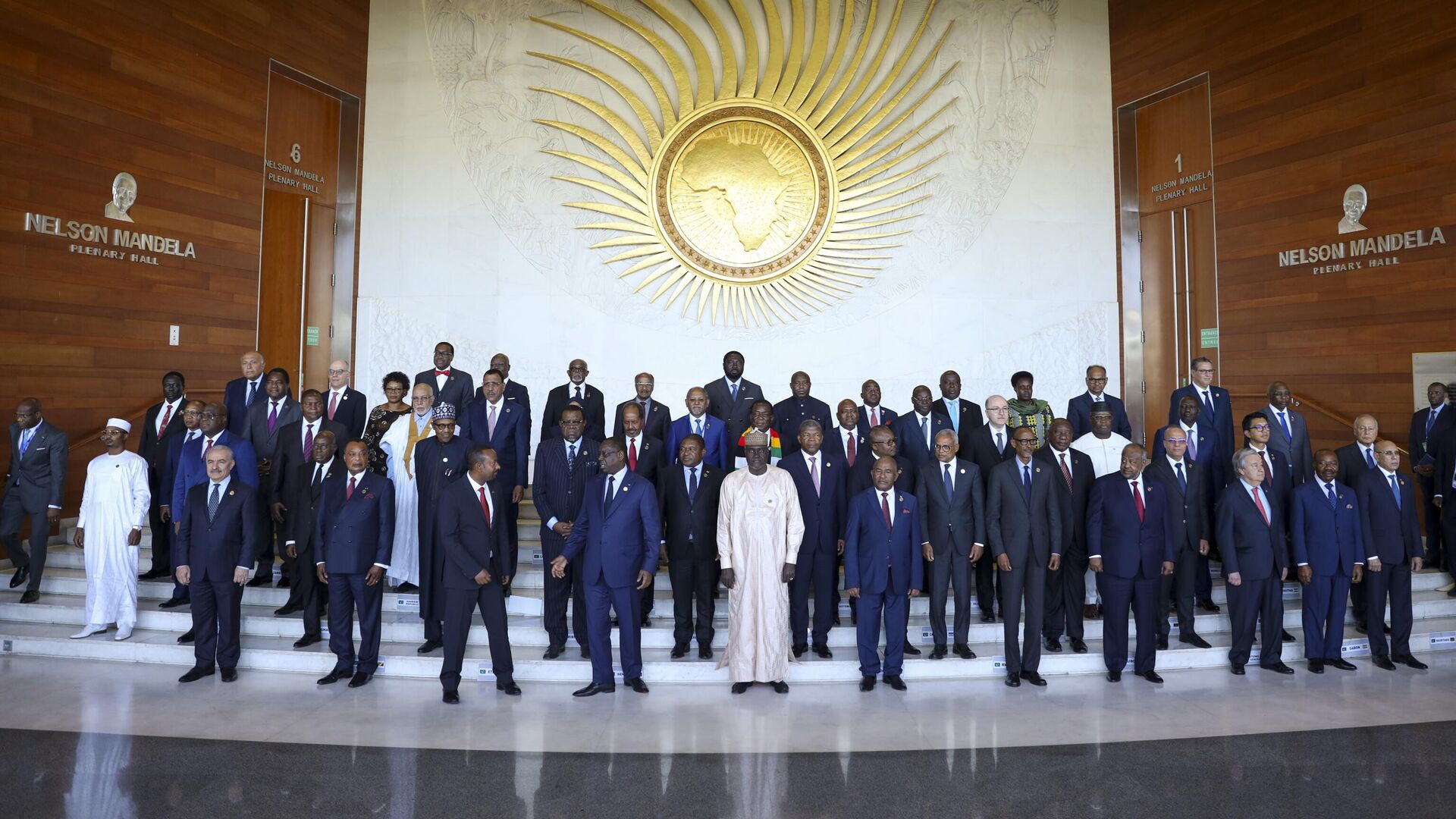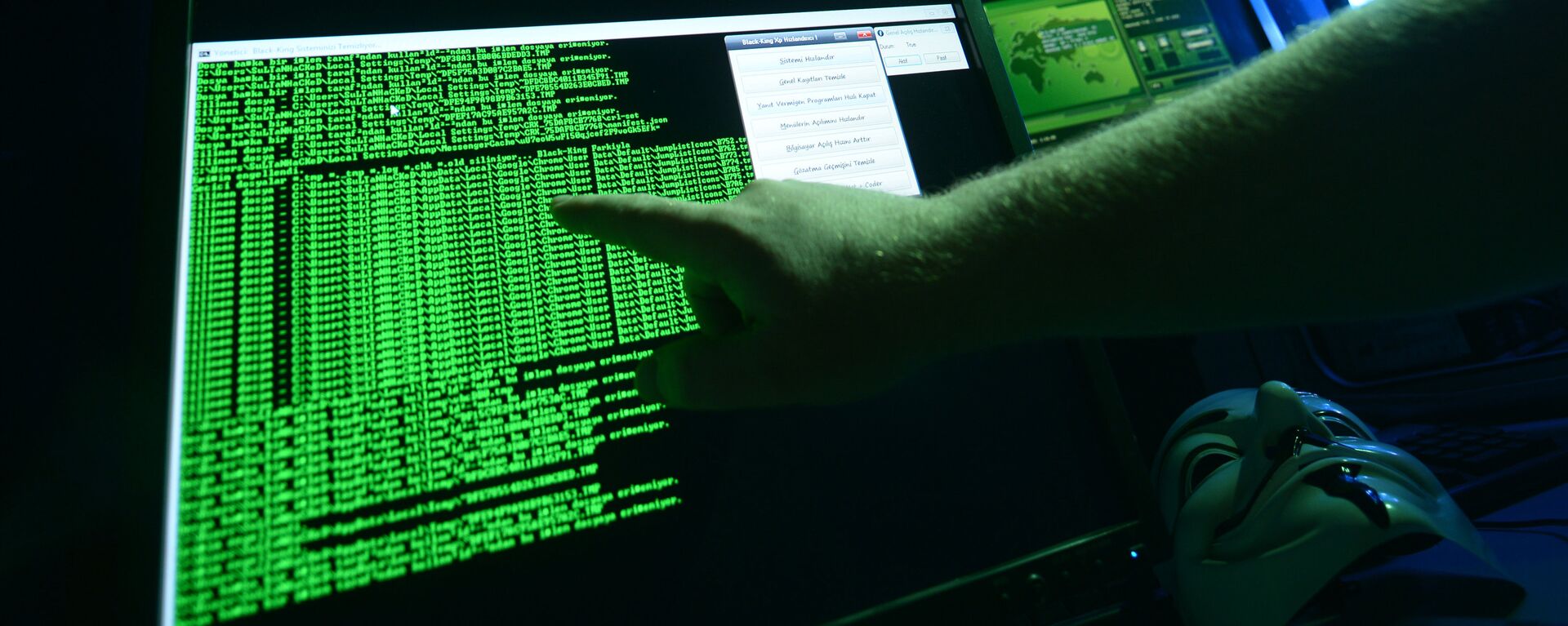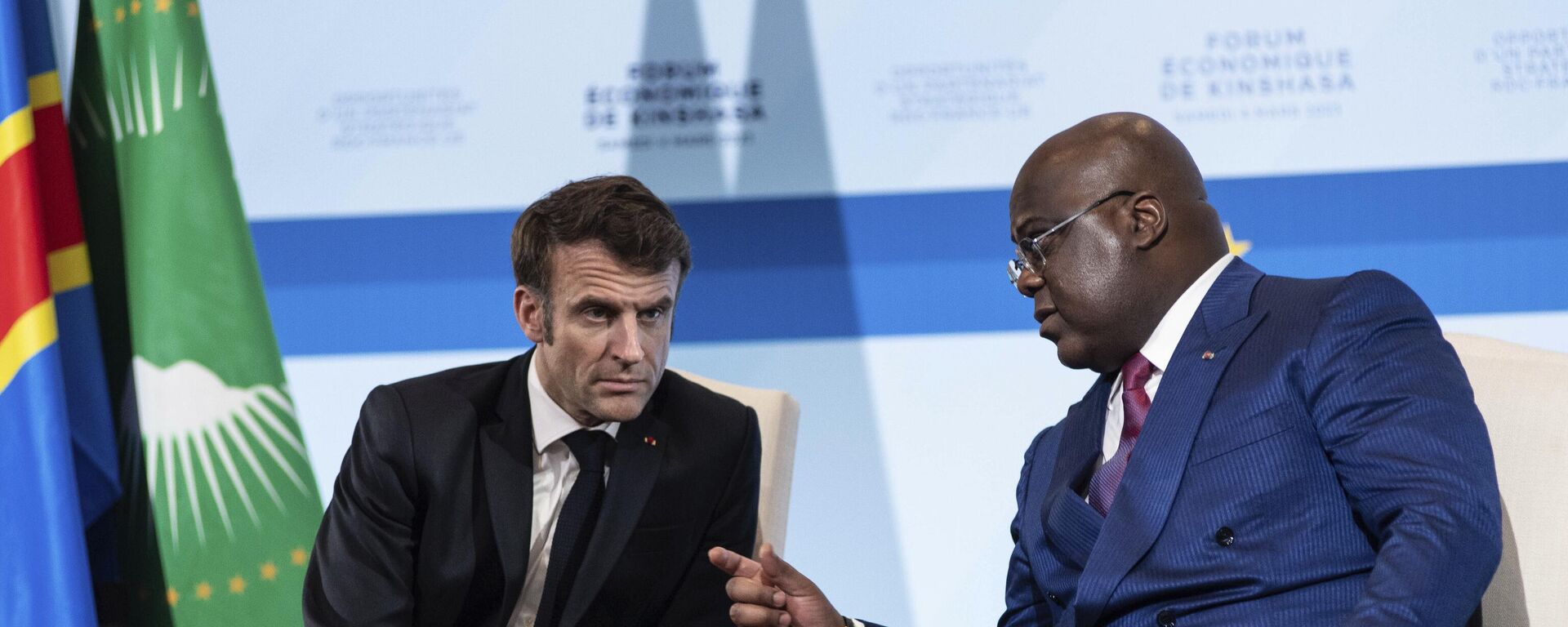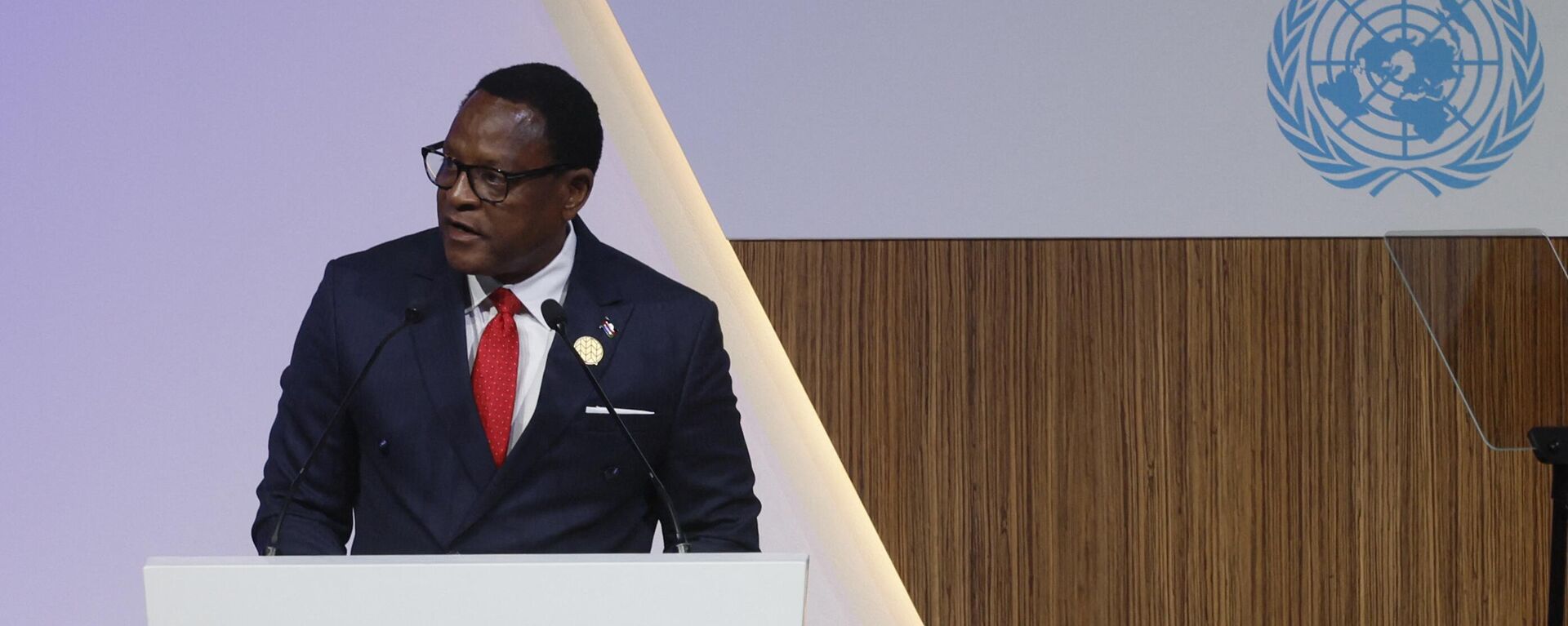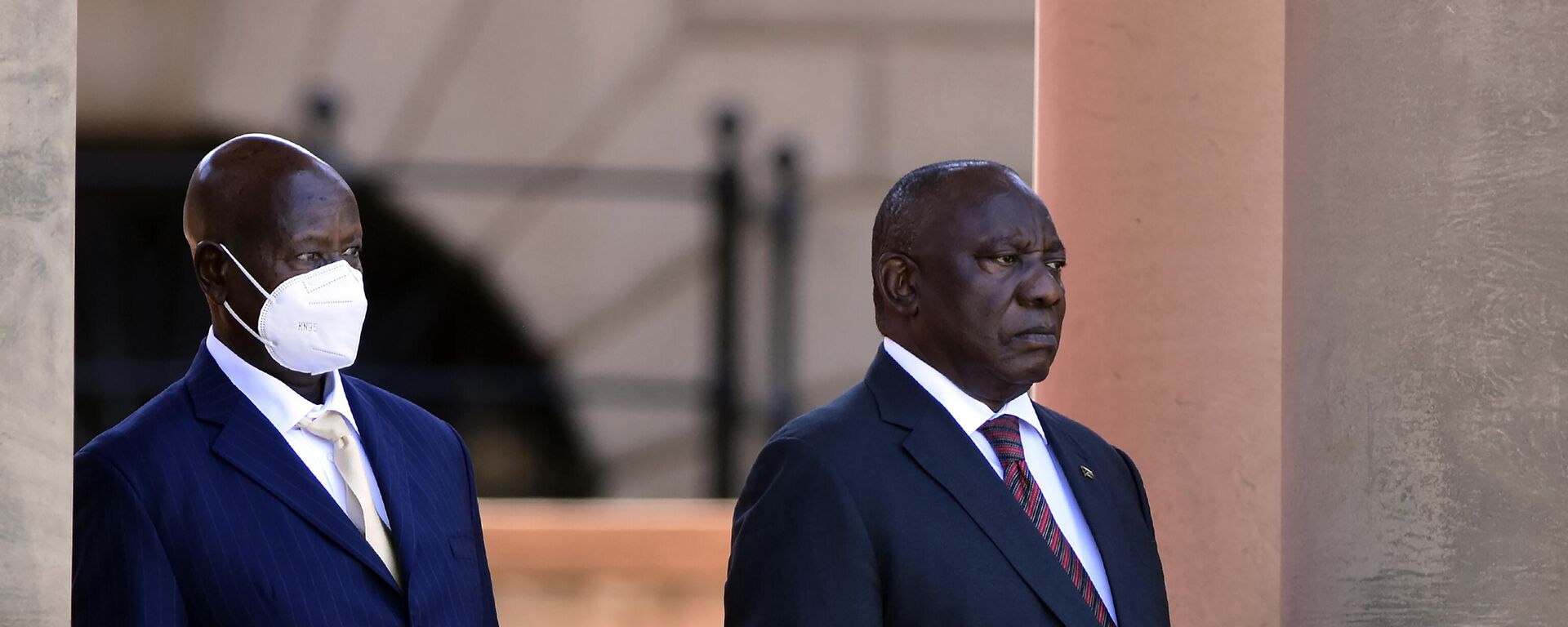https://sputnikglobe.com/20230315/cyber-attacks-on-au-west-does-not-want-african-unity-experts-say-1108413461.html
Cyber Attacks on AU: West Does Not Want African Unity, Experts Say
Cyber Attacks on AU: West Does Not Want African Unity, Experts Say
Sputnik International
The West wants "African countries to be more divided," Adu Yao Nikez, Associate Professor, People's Friendship University of Russia; Honorary Professor of Ural State University of Economics, PhD in Law says
2023-03-15T16:22+0000
2023-03-15T16:22+0000
2023-03-19T09:34+0000
africa
african union (au)
cyber attack
cybersecurity
russia
europe
china
involvement
africa insight
us
https://cdn1.img.sputnikglobe.com/img/07e7/03/0f/1108421988_0:320:3072:2048_1920x0_80_0_0_f30f05d8b32f628b1dc38c7939e39396.jpg
Taking into account the current international relations, the West could benefit from the recent cyber attack on the African Union's (AU) systems, as it wants "African countries to be more divided," Adu Yao Nikez, associate professor of the People's Friendship University of Russia, told us.The expert made this statement in an interview with Sputnik which was dedicated to the recent cyber attack reported by Ethiopia's The Reporter newspaper, which shut down and temporarily left the organization's personnel with no access to their emails.Tracing back the African Union's activities, one can notice that the recent cyber attack was not the first of its kind. The AU's cybersecurity has already been reported to be under risk.Alongside the cases of endangered AU's systems, experts and observers from the West have repeatedly accused China of being involved in hacking and spying activities in Africa.In December 2020, western media issued a report that said China had allegedly secretly redirected surveillance footage from the African Union headquarters located in Addis Ababa, Ethiopia. The allegations were denied both by Wang Wenbin, Chinese Ministry of Foreign Affairs spokesperson, and Moussa Faki, the chairperson of the AU Commission.Commenting on the consequences of the attack for the organization, Adu Yao Nikez said that for the AU as any kind of international organization linked with other parts of the world, the net connection makes a difference. "Any kind of attack on this instrument becomes an important break in the work of this organization," he explained.Elaborating, Nikez appealed to the absence of a common approach among the international community to dealing with such situations, which had repeatedly been raised by Russia.Another expert, Dr. Frederick Golooba-Mutebi, Ugandan independent researcher and political scientist with special interest in political economy, told Sputnik that the African Union's systems might contain classified information which, if leaked, could be used by malefactors to pursue their own goals.Dennis Matanda, CEO of Morgenthau Stirling Inc., professor of contemporary American politics and international business, described the cyber attack as "devastating."Elaborating on the implications of the attack, the professor recalled the example of the United Nations which was hacked in 2019. He underlined that in both cases, there are "exactly the same international relations or international law implications."However, the situation,'should be viewed from the perspective that "there are both challenges and opportunities."'Who could benefit from this? That's the question'Elaborating on the potential purpose and target of the attack, Adu Yao Nikez said that one should ask themselves "who profits from the crime?" Moreover, any act like that should be interpreted depending on the situation, the expert added."If you analyze what's happening now and the threats to the African countries," he continued, "the USA, for example, have passed a Bill to condemn those African countries that didn't support the UN resolution to protect the interests of the US in Africa."More to that, Golooba-Mutebi believes competition for influence in Africa could be the reason for the reported cyber attacks. Any of the countries seeking to disseminate its influence on Africa could be a culprit," the expert noted.However, the expert does not exclude that there is a chance of private individuals seeking financial gain.Speaking about the benefits, he also said in case that the intruder gets access to the desired information, it "might be better positioned to influence what the AU is thinking or what the AU is planning to do and also to influence the thinking of its member states."Matanda believes anyone could commit the cyber attack. However, he said, the situation is needed to be viewed from different perspectives.For instance, one has to remember that the African Union is now negotiating very key elements of the African Continental Free Trade Area.Not the best way for China to 'react to African countries'Speaking about the accusations by the West of China being ostensibly involved in hacking and spying activities on the African continent in the past, the experts also shared their point of view.Yao Nikez said there is no need for China to undermine the relationships with African countries, particularly via the African Union. He also mentioned the fact that Beijing built the organization's headquarters in Addis Ababa, Ethiopia, as a gift and added that "from the moment of the creation of the AU, the former Organization of African Unity, from 1963 until today, no European countries, particularly no EU member, France, nor the UK, nor the USA provided such support to this organization."Concerning the reports about the alleged Chinese involvement in hacking and spying activities in the past, Nikez asked "where do we get this information from?" In his opinion, European mass media's main idea is to undermine the relationship beween China and African countries by disinforming the international opinion, particularly African people.Golooba-Mutebi, in turn, has similar points of view on the Europe-led anti-China propaganda. He said it is part of the strategy by western countries using their media.Golooba-Mutebi believes that the West "badmouths" China in order to influence world opinion against it and slow down Beijing's advance, as it has already become a major competitor.In contrary to them, Matanda believes there was no anti-China campaign by western media.AU 'more powerful' than everSputnik also asked the experts to share their point of view on the present state of the AU and the intergovernmental cooperation.Concerning that, Yao Nikez emphasized that since African countries got independence, they have been facing real problems, taking into account the existing international legal framework, which, in turn, "impeded the development" of Africa.To overcome the obstacles for development, Nikez believes, Africans must work together.He recalled the example of Nigeria, whose income was almost completely spent to pay its foreign debt during the COVID-19 times, and emphasized that in such conditions it is impossible to develop. "We need to know international relations in order to overcome this situation," he said, adding that African countries must do it jointly, working together to be real actors in the international community, not separately.Golooba-Mutebi, in turn, stated that the African Union "performs below potential," substantiating that by his opinion that "every international organization is as strong or effective as its member states."The expert said that one of many weaknesses of the African Union is that a lot of its activities and programs are funded by international actors, not by Africans themselves, which opens the AU to influence from outside.African countries, the expert believes, will remain weak "for as long as they are not prepared to pay their dues to the AU, for as long as they are not prepared to sit together and decide how they want the AU to help them or to act in championing their interests."Matanda, in contrast, said the African Union is sitting in a "very, very powerful position."As one of the achievements of the AU, he pointed out the African Continental Free Trade Area, which is the world's largest free trade area by member countries and size.The professor said that one should not forget that the African Union is "built on what they call eight building block" consisting of COMESA (Common Market for Eastern and Southern Africa), EAC (East African Community), IGAD (Intergovernmental Authority on Development), ECOWAS (Economic Community of West African States), SADC (Southern African Development Community), ECCAS (Economic Community of Central African States), CEN-SAD (Community of Sahel–Saharan States), and AMU (Arab Maghreb Union). All these organizations work with the African Union and there is a very strong coordinating mechanism.The weak are easy to exploitSpeaking about the West's attitude towards a more integrated Africa, Yao Nikez says it is not interested in this.The expert believes western powers want African countries to be divided in order to "be more."He said that European countries could support Africa in dealing with problems it is facing, but it is not of their interest.Golooba-Mutebi expanded the topic, saying integrated Africa poses a threat to international actors willing to keep their influence on the continent.He thinks that when Africans are divided, Western powers are able to influence one country after another on an individual basis, which is much simpler to do than if these countries were acting as a single bloc.Dennis Matanda believes that the West does not understand the benefits of integrated Africa. He says western countries do not juxtapose the African Continental Free Trade Area with the US, which is "50 countries that have different constitutions, different borders, different rules, different justice systems," while Africa is 55 countries that all have the different thing, different languages."
https://sputnikglobe.com/20230313/african-unions-systems-crashed-by-massive-cyber-attack-report-says-1108346062.html
https://sputnikglobe.com/20221228/biggest-baddest-and-most-brazen-cyberattacks-hacks-and-data-leaks-of-2022-1105862394.html
https://sputnikglobe.com/20221201/top-five-initiatives-to-combat-cybercrimes-in-africa-1104887565.html
https://sputnikglobe.com/20230310/france-wants-to-tear-russia-china-away-from-africa-political-activist-says-1108256327.html
https://sputnikglobe.com/20230306/african-leaders-call-for-concrete-action-to-end-wests-era-of-unkept-promises-at-un-summit-1108084218.html
https://sputnikglobe.com/20230305/african-solutions-to-african-problems-ramaphosa-says-1108056718.html
africa
russia
china
Sputnik International
feedback@sputniknews.com
+74956456601
MIA „Rossiya Segodnya“
2023
News
en_EN
Sputnik International
feedback@sputniknews.com
+74956456601
MIA „Rossiya Segodnya“
Sputnik International
feedback@sputniknews.com
+74956456601
MIA „Rossiya Segodnya“
african union cyber attack, african union systems crashed
african union cyber attack, african union systems crashed
Cyber Attacks on AU: West Does Not Want African Unity, Experts Say
16:22 GMT 15.03.2023 (Updated: 09:34 GMT 19.03.2023) The reported recent cyber attacks on the African Union's systems have aroused a lot of questions about who and what may lurk behind the disrupting activity. While no specific information on the details of the case has emerged, several experts agreed to share their thoughts on the issue with Sputnik.
Taking into account the current international relations, the West could benefit from the recent cyber attack on the African Union's (AU) systems, as it wants "African countries to be more divided," Adu Yao Nikez, associate professor of the People's Friendship University of Russia, told us.
The expert made this statement in an interview with Sputnik which was dedicated to the recent cyber attack reported by Ethiopia's The Reporter newspaper, which shut down and temporarily left the organization's personnel with no access to their emails.
Tracing back the African Union's activities, one can notice that the recent cyber attack was not the first of its kind. The AU's cybersecurity has already been reported to be under risk.
Alongside the cases of endangered AU's systems, experts and observers from the West have repeatedly accused China of being involved in hacking and spying activities in Africa.
In December 2020, western media issued a report that said China had allegedly secretly redirected surveillance footage from the African Union headquarters located in Addis Ababa, Ethiopia. The allegations were denied both by Wang Wenbin, Chinese Ministry of Foreign Affairs spokesperson, and Moussa Faki, the chairperson of the AU Commission.
Commenting on the consequences of the attack for the organization, Adu Yao Nikez said that for the AU as any kind of international organization linked with other parts of the world, the net connection makes a difference. "Any kind of attack on this instrument becomes an important break in the work of this organization," he explained.
Elaborating, Nikez appealed to the absence of a common approach among the international community to dealing with such situations, which
had repeatedly been raised by Russia.
"This is a good moment for the African countries to join Russia together in order to put this idea on the table within the United Nations [...] As we used to say during the difficult moments, it is a great moment to have international consensus on this issue. So why not? I hope that could push African countries to join Russia together in order to put this idea on the table," the expert statee.
Another expert,
Dr. Frederick Golooba-Mutebi, Ugandan independent researcher and political scientist with special interest in political economy, told Sputnik that the African Union's systems might contain classified information which, if leaked, could be
used by malefactors to pursue their own goals.
"Depending on what kind of information it is, it could be highly compromising. It could undermine its own strategizing around several things. It could also reveal information that might be compromising of various aspects of the policies of various member states," the political scientist explained.
Dennis Matanda, CEO of Morgenthau Stirling Inc., professor of contemporary American politics and international business, described the cyber attack as "devastating."
Elaborating on the implications of the attack, the professor recalled the example of the United Nations which was hacked in 2019. He underlined that in both cases, there are "exactly the same international relations or international law implications."
"Well, if you hack the African Union, which has 55 member states, it has major international consequences," the expert said.
However, the situation,'should be viewed from the perspective that "there are both challenges and opportunities."
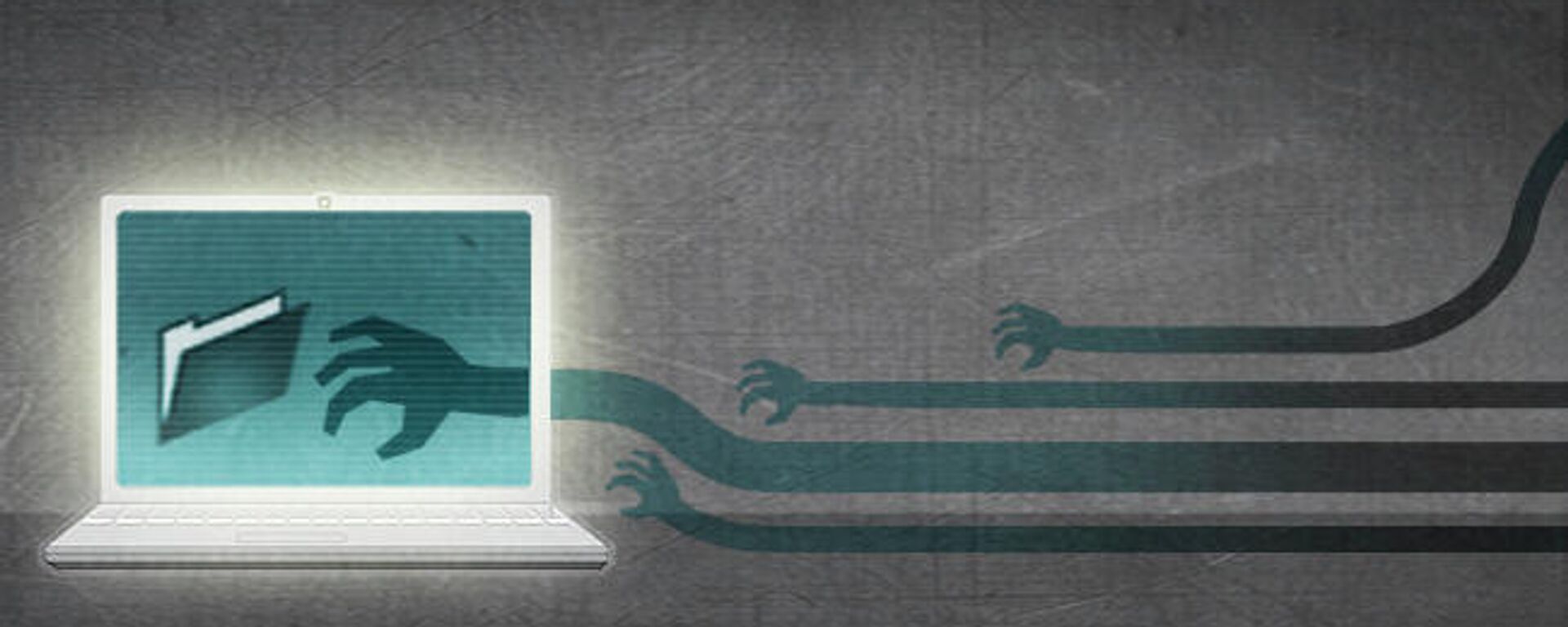
28 December 2022, 18:03 GMT
'Who could benefit from this? That's the question'
Elaborating on the potential purpose and target of the attack, Adu Yao Nikez said that one should ask themselves "who profits from the crime?" Moreover, any act like that should be interpreted depending on the situation, the expert added.
"If you analyze what's happening now and the threats to the African countries," he continued, "the USA, for example, have passed a
Bill to condemn those African countries that didn't support the UN resolution to
protect the interests of the US in Africa."
"I think that we need to treat this, interpret this issue in this way – who benefits from this attack. So, of course, maybe the western countries want to know exactly what's going on within the African Union, taking into account the current situation?" Nikez questioned.
More to that, Golooba-Mutebi believes competition for influence in Africa could be the reason for the reported cyber attacks. Any of the countries seeking to disseminate its influence on Africa could be a culprit," the expert noted.
"I wouldn't know specifically who the parties are, but as I mentioned to you, I would really put my money on these powers that are competing for influence in Africa," Golooba-Mutebi stated.
However, the expert does not exclude that there is a chance of private individuals seeking financial gain.
Speaking about the benefits, he also said in case that the intruder gets access to the desired information, it "might be better positioned to influence what the AU is thinking or what the AU is planning to do and also to influence the thinking of its member states."
Matanda believes anyone could commit the cyber attack. However, he said, the situation is needed to be viewed from different perspectives.
For instance, one has to remember that the African Union is now negotiating very key elements of the African Continental Free Trade Area.
"Is there a chance that somebody would like to hobble that process?" the expert questions, adding: "The other side to it is that is there a chance that a person was playing around in the system, stole certain information and then to prevent them from being caught, they decided to launch a comprehensive hack that you get to lose information."
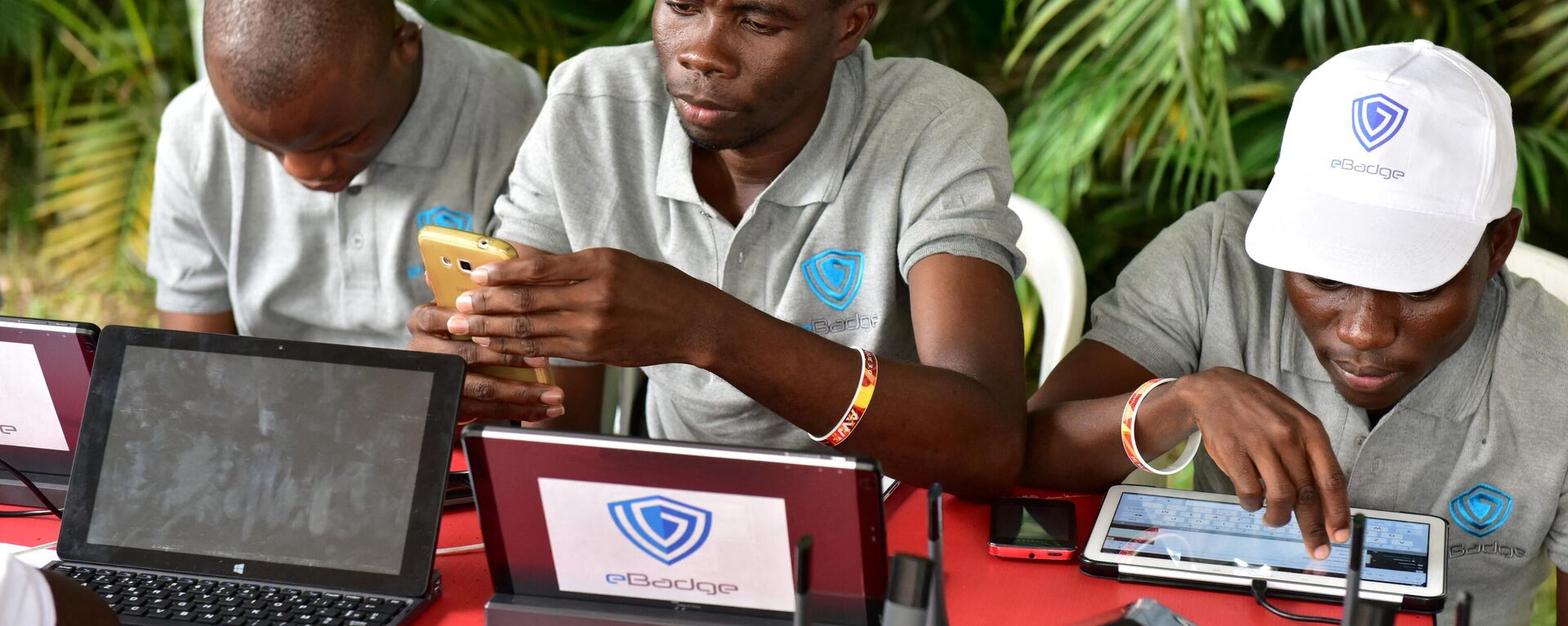
1 December 2022, 07:41 GMT
Not the best way for China to 'react to African countries'
Speaking about the accusations by the West of China being ostensibly involved in hacking and spying activities on the African continent in the past, the experts also shared their point of view.
Yao Nikez said there is no need for China to undermine the relationships with African countries, particularly via the African Union. He also mentioned the fact that Beijing built the organization's headquarters in Addis Ababa, Ethiopia, as a gift and added that "from the moment of the creation of the AU, the former Organization of African Unity, from 1963 until today, no European countries, particularly no EU member, France, nor the UK, nor the USA
provided such support to this organization."
"The presence of China in Africa is not comfortable for these countries, so we need to take into account this moment," the expert noted, adding: "For African leaders it's not the time to be in trouble with China. As I mentioned earlier, China has a lot of instruments to react to African countries. So that is not the best way."
Concerning the reports about the alleged Chinese involvement in hacking and spying activities in the past, Nikez asked "where do we get this information from?" In his opinion, European mass media's main idea is to undermine the relationship beween China and African countries by disinforming the international opinion, particularly African people.
Golooba-Mutebi, in turn, has similar points of view on the Europe-led anti-China propaganda. He said it is part of the strategy by western countries using their media.
"I think that in Africa we make a lot of mistakes in thinking that western media necessarily is far removed from the thinking or actions of our governments. I think that this is western governments and their media joining hands to try and undermine China in various ways," the political scientist continued.
Golooba-Mutebi believes that the West "badmouths" China in order to influence world opinion against it and slow down Beijing's advance, as it has already become a major competitor.
In contrary to them, Matanda believes there was no anti-China campaign by western media.
"It was not a major story. The fact that The Guardian reported it another way. Reuters reported in another way. QZ reported this another way. I'm trying to say it's not a conspiracy. It is not a plan by all these various media houses to release a story. It is just news," the professor explained.
AU 'more powerful' than ever
Sputnik also asked the experts to share their point of view on the present state of the AU and the intergovernmental cooperation.
Concerning that, Yao Nikez emphasized that since African countries got independence, they have been facing real problems, taking into account the existing international legal framework, which, in turn, "impeded the development" of Africa.
"There's no justice in international relations, unfortunately," the expert stated.
To overcome the obstacles for development, Nikez believes, Africans must work together.
He recalled the example of Nigeria, whose income
was almost completely spent to pay its foreign debt during the COVID-19 times, and emphasized that in such conditions it is impossible to develop. "We need to know international relations in order to overcome this situation," he said, adding that African countries must do it jointly, working together to be real actors in the international community, not separately.
Golooba-Mutebi, in turn, stated that the African Union "performs below potential," substantiating that by his opinion that "every international organization is as strong or effective as its member states."
The expert said that one of many weaknesses of the African Union is that a lot of its activities and programs
are funded by international actors, not by Africans themselves, which opens the AU to influence from outside.
"He who pays the piper, calls the tune," Golooba-Mutebi said, describing the external influence on the AU's decision-making process.
"I have personally in the past sat in AU meetings where the number of western representatives, ambassadors and all kinds of representatives of western countries are just as large a number as representatives of African countries and I wonder, 'Is this an AU meeting or a UN meeting?'" the political scientist stated.
African countries, the expert believes, will remain weak "for as long as they are not prepared to pay their dues to the AU, for as long as they are not prepared to sit together and decide how they want the AU to help them or to act in championing their interests."
Matanda, in contrast, said the African Union is sitting in a "very, very powerful position."
"The African Union activities are receiving better funding and they are not only receiving funding from abroad, they are also being funded by entities like the AFREXIMBANK or the Trade and Development Bank. They are funding actual activities," he said, adding: "African Union activities are no longer just laughed out. They are very important."
As one of the achievements of the AU, he pointed out the African Continental Free Trade Area, which is the world's largest free trade area by member countries and size.
The professor said that one should not forget that the African Union is "built on what they call eight building block" consisting of COMESA (Common Market for Eastern and Southern Africa), EAC (East African Community), IGAD (Intergovernmental Authority on Development), ECOWAS (Economic Community of West African States), SADC (Southern African Development Community), ECCAS (Economic Community of Central African States), CEN-SAD (Community of Sahel–Saharan States), and AMU (Arab Maghreb Union). All these organizations
work with the African Union and there is a very strong coordinating mechanism.
"So the African Union is more powerful, more important, more central to decision making than ever before," the expert believes.
The weak are easy to exploit
Speaking about the West's attitude towards a more integrated Africa, Yao Nikez says it is not interested in this.
The expert believes western powers want African countries to be divided in order to "be more."
He said that European countries could support Africa in dealing with problems it is facing, but it is not of their interest.
"According to the statement of the EU commissioner last year, they [European countries] were expecting about $1 billion to deal with the security problems. European countries promised, but they didn't do it. And look what's happening now. Within one year from January last year to January this year, the USA alone provided $73 billion to support Ukraine. $38 billion from European countries, $6 billion from the UK and so on. What does this mean?" Nikez questioned.
Golooba-Mutebi expanded the topic, saying integrated Africa poses a threat to international actors willing to keep their influence on the continent.
He thinks that when Africans are divided, Western powers are able to influence one country after another on an individual basis, which is much simpler to do than if these countries were acting as a single bloc.
"When Africa is weak, it's easy to exploit, it's easy to influence, it's easy to drive in different directions," Golooba-Mutebi states.
Dennis Matanda believes that the West does not understand the benefits of integrated Africa. He says western countries do not juxtapose the African Continental Free Trade Area with the US, which is "50 countries that have different constitutions, different borders, different rules, different justice systems," while Africa is 55 countries that all have the different thing, different languages."
"The point I'm trying to make is the West does not understand Africa. The West does not know how to take advantage of the opportunities that sit there. Lastly, the West does not see the very clear and present opportunity of an amalgamated Africa," he said.
